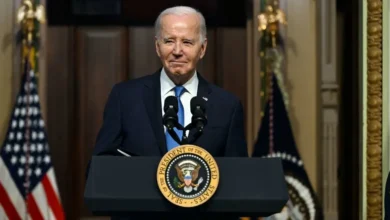‘Progress’: How Eid is becoming a US school holiday

Growing up in the United States, Selaedin Maksut would skip school on Eid to go to the mosque, attend festivities with his family and celebrate one of the most joyous days for Muslims across the world.
While he said he never regretted the decision, he was burdened by having to miss classes.Now, as the director of the New Jersey chapter of the Council on American-Islamic Relations (CAIR-NJ), Maksut has been helping a new generation of Muslim-American students have the day off school.
“We’re optimistic,” Maksut told Al Jazeera, stressing that the effort aims to “free” Muslim students from having to choose between academic success and observing the holiday.
In New Jersey and across the US, dozens of public schools have recognised Eid as an official holiday in recent years – a trend Muslim-American advocates said was the product of their activism, as well as a sign of the growing prominence of Muslim communities in the country.
“[Students] want to be able to freely go to the masjid [mosque] and pray, be with their family and enjoy the day, and then return to school the next day knowing that they did not miss any exams or any tests or any homework,” Maksut told Al Jazeera.CAIR-NJ has created a toolkit to help parents, students and activists urge schools to adopt Eid as a holiday, including a draft letter highlighting the dilemma that Muslim students face between prioritising their school attendance or religious duties.
“We’re going to continue to have boots on the ground and work with community members to mobilise and help them find their voice and empower them to seek these accommodations … to create societies that are more inclusive and welcoming of everybody.”
‘More progress’
Islam has two major holidays known as Eid – the Arabic word for holiday or festival.Eid al-Fitr, which will be observed on Friday, marks the end of the holy month of Ramadan, during which Muslims are required to refrain from consuming food or liquids from sunrise to sunset. The second holiday, Eid al-Adha, marks the end of the Hajj pilgrimage and typically falls about two months after Eid al-Fitr.
Islam follows a lunar calendar, so the holidays do not fall on the same date in the school calendar every year.
But dozens of school districts across the US – primarily those with large numbers of Muslim students – are making an effort to mark Eid al-Fitr, and sometimes both Eids, as days off when they are celebrated during the school year.
Muslims account for approximately 1 percent of the US population, according to a 2018 Pew Research Center survey, but a few states, including New Jersey and Michigan, have a higher concentration of Muslim residents.
The push to recognise Eid in schools has not faced prominent opposition at the national level, highlighting a receding right-wing effort to portray any government accommodation of Muslims as a conspiracy to impose Islamic rules on Americans, Maksut said.
“Post 9/11, I remember the language of ‘Islamisation’ and ‘Muslims are taking over’ and ‘Sharia law [Islamic law] is creeping into the schools’,” he told Al Jazeera.
“While we occasionally still see that – although not as much – what we’re seeing now is much more progress, we’re seeing much more proactive efforts, and we’re seeing that Muslims are being accommodated in a lot of places.”










